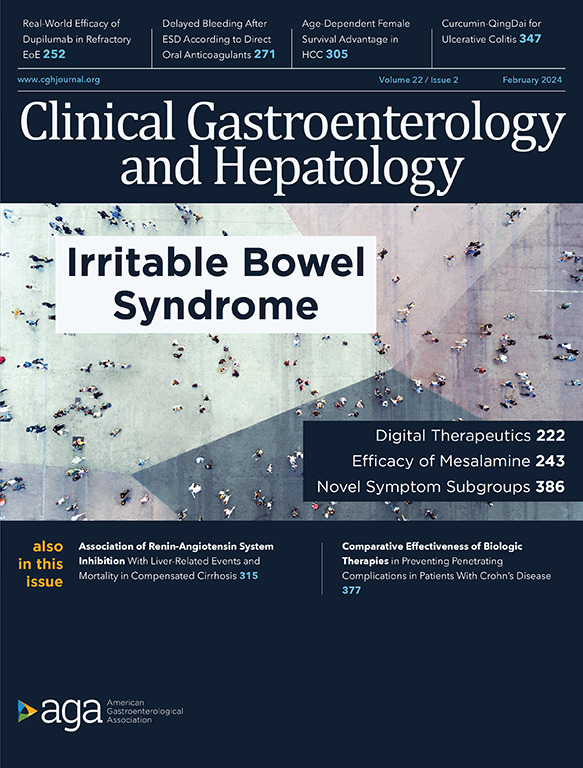炎症性肠病妊娠管理全球共识声明
IF 12
1区 医学
Q1 GASTROENTEROLOGY & HEPATOLOGY
引用次数: 0
摘要
背景与目的:对于患有炎症性肠病(IBD)的女性来说,怀孕是一个复杂且充满风险的事件。在这一人群中缺乏高质量的研究,关于批准治疗妊娠期IBD的药物的数据有限。对于患者来说,关于妊娠的有限知识会影响妊娠率、药物依从性和结局。由于当地教条、现有资源、对文献的个人解读以及对伤害胎儿的恐惧,有限的提供者知识导致了护理实践的高度多样化。不同社会和国家指南的差异反映了这一点,并导致医生和患者都感到困惑。全球共识联盟由来自六大洲的39名IBD和内容专家以及7名患者倡导者组成,他们召开会议审查和评估当前数据,并就基于这些数据的最佳做法达成协议。方法:当有足够的公开数据可用时,使用GRADE(分级建议评估、开发和评价)过程;在需要专家意见指导一致实践的情况下,使用RAND(研究与开发)过程。提出建议的指导原则是,产妇保健最好地支持婴儿保健。结果:主题分为10个类别,34个GRADE建议和35个共识声明。结论:总体而言,该小组的目标是根据现有的最佳研究,提供数据驱动和实用的指导,以改善全球女性IBD患者的护理。本文章由计算机程序翻译,如有差异,请以英文原文为准。

Global Consensus Statement on the Management of Pregnancy in Inflammatory Bowel Disease
Background & Aims
Pregnancy can be a complex and risk-filled event for women with inflammatory bowel disease (IBD). High-quality studies in this population are lacking, with limited data on medications approved to treat IBD during pregnancy. For patients, limited knowledge surrounding pregnancy impacts pregnancy rates, medication adherence, and outcomes. Limited provider knowledge leads to highly varied practices in care affected by local dogma, available resources, individual interpretation of the literature, and fear of harming the fetus. The variations in guidelines by different societies and countries reflect this and lead to confusion for physicians and patients alike. The Global Consensus Consortium is a group of 39 IBD and content experts and 7 patient advocates from 6 continents who convened to review and assess current data and come to an agreement on best practices based on these data.
Methods
The GRADE (Grading of Recommendations Assessment, Development, and Evaluation) process was used when sufficient published data were available and the RAND (Research and Development) process in those instances where expert opinion was needed to guide consistent practice. Recommendations were informed by the guiding principle that maternal health best supports infant health.
Results
The topics were divided into ten categories with 34 GRADE recommendations and 35 consensus statements.
Conclusions
Overall, the goal of the group was to provide data-driven and practical guidance to improve the care of women with IBD around the globe based on the best available research.
求助全文
通过发布文献求助,成功后即可免费获取论文全文。
去求助
来源期刊
CiteScore
16.90
自引率
4.80%
发文量
903
审稿时长
22 days
期刊介绍:
Clinical Gastroenterology and Hepatology (CGH) is dedicated to offering readers a comprehensive exploration of themes in clinical gastroenterology and hepatology. Encompassing diagnostic, endoscopic, interventional, and therapeutic advances, the journal covers areas such as cancer, inflammatory diseases, functional gastrointestinal disorders, nutrition, absorption, and secretion.
As a peer-reviewed publication, CGH features original articles and scholarly reviews, ensuring immediate relevance to the practice of gastroenterology and hepatology. Beyond peer-reviewed content, the journal includes invited key reviews and articles on endoscopy/practice-based technology, health-care policy, and practice management. Multimedia elements, including images, video abstracts, and podcasts, enhance the reader's experience. CGH remains actively engaged with its audience through updates and commentary shared via platforms such as Facebook and Twitter.

 求助内容:
求助内容: 应助结果提醒方式:
应助结果提醒方式:


